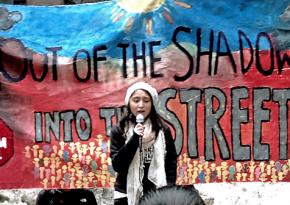The shadows to the streets
Undocumented youth and parents are still waiting for the Obama administration to keep its promises, report and .
DESPITE CLOUDY skies and a cold rain, an animated crowd of more than 500 people rallied March 10, chanting "Born in the USA, don't take my mommy and daddy away!" to draw attention to the plight of undocumented immigrants in the U.S. Carrying signs that read, "Obama, keep your promise" and "No more deportations," people gathered at Chicago's Federal Plaza to demand that the federal government stop ripping families apart with its program of mass deportations.
For the fourth year in a row, hundreds of people--both undocumented and native-born--took to the streets on "National Coming Out of The Shadows" Day to demand change. This year, however, more than immigration reform, people were demanding--from Obama specifically--a moratorium on all detentions and deportations. The message was unmistakable: "We are undocumented, unafraid and undivided!"
"Through organizing, we can actually stop deportations, and we can actually affect policy," said Rigo Padilla, an activist in the immigrant community as he explained the tactic of "coming out." "When we remain in the shadows, that is when deportations happen."

Efraín Muños, a father of four and a warehouse worker, is facing deportation after being arrested by Immigration and Customs Enforcement (ICE) agents in a workplace raid in the northwest Chicago suburb of Elk Grove Village last November.
"I am here to demand an end to deportations," Muños told the crowd. "I am not a delinquent. I have been here for 14 years, I pay my taxes. My only crime is to work honestly."
His case is hardly exceptional. The Obama administration has overseen more than 1.5 million deportations since 2009. And according to a report by the Migration Policy Institute, the U.S. spent more money on immigration enforcement--nearly $18 billion in 2012--than on the FBI, Secret Service, Drug Enforcement Administration, U.S. Marshal Service, and Bureau of Alcohol, Tobacco, Firearms and Explosives combined.
While the crowd, made up largely of workers and undocumented youth who've risked arrest in support of the DREAM Act, waited for those marching from Union Park to arrive at Federal Plaza, a number of speakers and performers took the stage to share their stories and speak their mind.
One of those performers was Stephanie Camba, a young undocumented woman from the Philippines. "I come from a family of hardworking people," said Camba. "And today, we march on stolen land for those who work with tired hands." Stephanie is an organizer with the Immigrant Youth Justice League, which played a key role in organizing the action. She is also a spoken word artist with Elephant Rebellion.
The mother of Rossette Valladares, another young undocumented activist, crossed the border into the U.S. carrying an 8-month-old Rossette in her arms. "To this day, her voice still shakes--like her knees--when she recounts running across the border away from border patrol," explained Valladares when she took the stage.
When asked why she decided to attend the march, Rossette, a bespectacled queer Latina with a warm smile and shy demeanor, replied, "I'm here today to come out from under the shadow of my oppressors and into the lights of libertad." Rossette is a board member of Amigas y Amiguitas Latinas, a nonprofit organization that connects queer Latinas with community resources. She is also an organizer with Dyke March Chicago, which is how she got her start as a community organizer.
SINCE IMPLEMENTATION of the Deferred Action for Childhood Arrivals memorandum in 2012, a large number of young activists and their parents have taken to the streets to demand the right to stay in the U.S. and live with dignity, free of the fear that one day their families might be separated and deported. Many young people carried signs that read, "What about my parents?" while the signs of many parents read, "We are the dreamers."
From the stage, many people spoke of having some children who qualified for deferred action while others did not. They spoke of the anguish of knowing that they would most certainly, at some point, be separated.
For many at the rally, the reality of immigration reform is both close and far away--close because of the new effort by politicians to use the issue to court the Latino vote, and yet far because, as Rigo Padilla put it, "We are not okay with the border being further militarized...We demand they treat our parents with dignity and respect."
Border security and a "tough but fair" path to legalization are part of the framework for immigration reform under the Obama administration.
As Washington elites debate the most "politically friendly" way to administer second-class citizenship for 11 million undocumented workers, the chants and banners in Chicago were loud and clear: Deportations must end.
Actions like January's March for a Moratorium on Deportations--that took place during Obama's inauguration--and the March 10 event are clear indications that the movement is building momentum. And as May Day rolls around, plans for labor- and student-led actions are underway, including a national march on Washington on April 10.
Much depends on the type of movement we are willing to build, and the fight we are willing to wage. The movement's strength will come from its ability to acknowledge and address how the issues of immigrant rights (or lack thereof) relate to capitalism's attack on workers globally, and nothing short of a diverse and unified working-class movement that fights for the rights of all workers will bring about the type of economic and social change that we all deserve.


